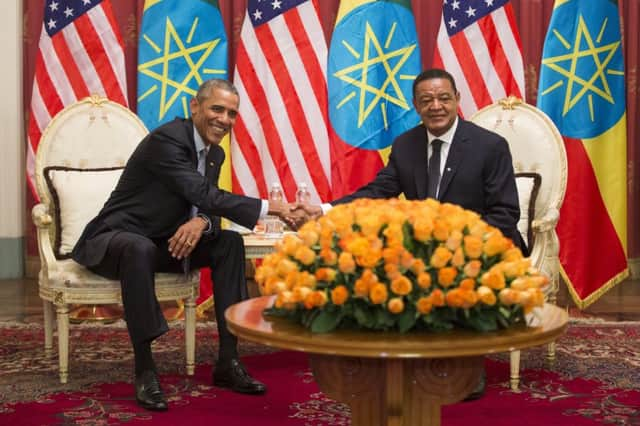Barack Obama warns Ethiopia over press freedom


“When all voices are being heard, when people know they are being included in the political process, that makes a country more successful,” Mr Obama said during a news conference with Ethiopian prime minister Hailemariam Desalegn.
Mr Obama’s trip marks the first visit by a sitting US president to Ethiopia, a fast-growing economy once defined by poverty and famine.
Advertisement
Hide AdAdvertisement
Hide AdLater yesterday, the US president convened a meeting with African leaders on the crisis in South Sudan, telling them he hoped the discussion would help to “bring about the kind of peace that the people of South Sudan so desperately need”. The world’s newest nation has been gripped by violence as warring factions in the government fight for power.
“The conditions on the ground are getting much, much worse,” Mr Obama said.
He added if a peace agreement isn’t reached by a 17 August deadline, the US and its partners would have to “consider what other tools we have”.
Options under consideration include deepening economic sanctions and an arms embargo.
Mr Obama arrived in Ethiopia late on Sunday following a stop in Kenya, the country of his father’s birth.
The crisis in South Sudan and the human rights challenges on his agenda punctured a trip that had otherwise been a celebratory visit of the first black US president to Africa.
Despite Ethiopia’s progress, there are deep concerns about political freedoms on the heels of May elections in which the ruling party won every seat in parliament.
Mr Obama said he was frank in his discussions with Ethiopian leaders about the need to allow political opponents to operate freely. He also defended his decision to travel to the east African nation, comparing it to US engagement with China, another nation with a poor human rights record.
Advertisement
Hide AdAdvertisement
Hide Ad“Nobody questions our need to engage with large countries where we may have differences on these issues,” he said. “That’s true with Africa as well.”
Ethiopia’s prime minister defended his country’s commitment to democracy.
“Our commitment to democracy is real – not skin deep,” he said. Asked about his country’s jailing of journalists, he said Ethiopia needed “ethical journalism” and reporters that don’t work with terrorist organisations.
Ethiopia imprisons the second highest number of journalists in Africa, after Eritrea, according to the Committee to Protect Journalists.
Ahead of Mr Obama’s arrival, the Ethiopian government released several journalists and bloggers it had been holding since April 2014 on charges of incitement and terrorism. Many others remain in detention.
Sarah Margon, the Washington director of the organisation Human Rights Watch, said the Us president’s visit undermines the president’s goals of good governance on the African continent.”